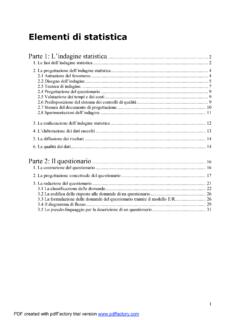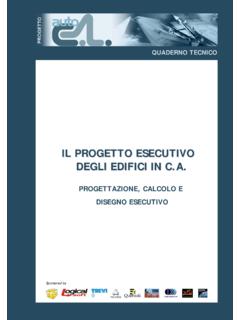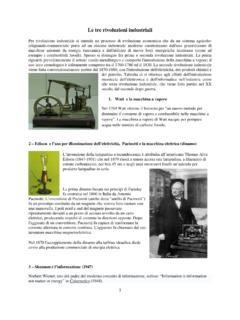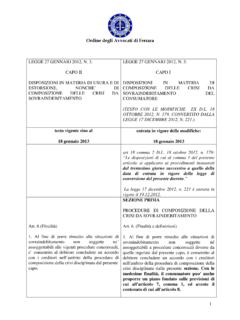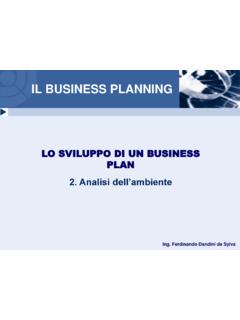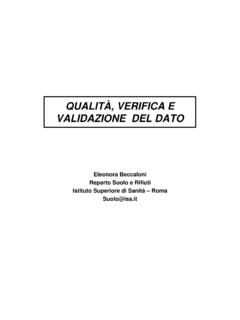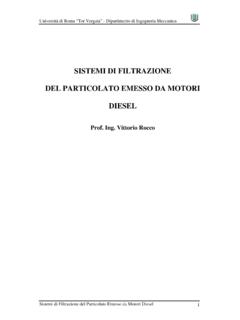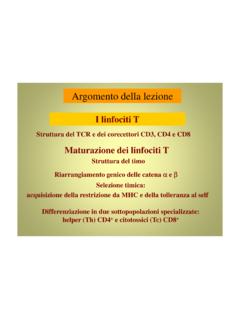Transcription of Managing Oneself - uniroma2.it
1 Managing OneselfBy Peter F. Drucker This article originally appeared in Harvard Business ReviewArticle Reprint No. R0501 Kbrought to you byHarvard Business Review articles are brought to you by Zurich HelpPoint as part of the Managing Risk neither endorses nor rejects the information presented in the article. We do not guarantee the accuracy of this information or any results and further assume no liability in connection with this publication including any information or methods contained herein. Managing Oneself page 1 The Idea in BriefThe Idea in Practice COPYRIGHT 2004 HARVARD BUSINESS SCHOOL PUBLISHING CORPORATION.
2 ALL RIGHTS RESERVED. We live in an age of unprecedented oppor-tunity: If you ve got ambition, drive, and smarts, you can rise to the top of your cho-sen profession regardless of where you started out. But with opportunity comes re-sponsibility. Companies today aren t man-aging their knowledge workers careers. Rather, we must each be our own chief ex-ecutive put, it s up to you to carve out your place in the work world and know when to change course. And it s up to you to keep yourself engaged and productive during a work life that may span some 50 do all of these things well, you ll need to cultivate a deep understanding of yourself.
3 What are your most valuable strengths and most dangerous weaknesses? Equally im-portant, how do you learn and work with others? What are your most deeply held val-ues? And in what type of work environment can you make the greatest contribution?The implication is clear: Only when you op-erate from a combination of your strengths and self-knowledge can you achieve true and lasting build a life of excellence, begin by asking yourself these questions: What are my strengths? To accurately identify your strengths, use feedback analysis . Every time you make a key decision, write down the outcome you ex-pect.
4 Several months later, compare the actual results with your expected results. Look for patterns in what you re seeing: What results are you skilled at generating? What abilities do you need to enhance in order to get the re-sults you want? What unproductive habits are preventing you from creating the outcomes you desire? In identifying opportunities for im-provement, don t waste time cultivating skill areas where you have little competence. In-stead, concentrate on and build on your strengths. How do I work? In what ways do you work best? Do you pro-cess information most effectively by reading it, or by hearing others discuss it?
5 Do you accomplish the most by working with other people, or by working alone? Do you per-form best while making decisions, or while advising others on key matters? Are you in top form when things get stressful, or do you function optimally in a highly predict-able environment? What are my values? What are your ethics? What do you see as your most important responsibilities for living a worthy, ethical life? Do your organization s ethics resonate with your own values? If not, your career will likely be marked by frustration and poor performance. Where do I belong? Consider your strengths, preferred work style, and values.
6 Based on these qualities, in what kind of work environment would you fit in best? Find the perfect fit, and you ll transform yourself from a merely acceptable employee into a star performer. What can I contribute? In earlier eras, companies told businesspeople what their contribution should be. Today, you have choices. To decide how you can best en-hance your organization s performance, first ask what the situation requires. Based on your strengths, work style, and values, how might you make the greatest contribution to your organization s efforts? Managing Oneself by Peter F.
7 Drucker harvard business review page 2 COPYRIGHT 2004 HARVARD BUSINESS SCHOOL PUBLISHING CORPORATION. ALL RIGHTS RESERVED. Success in the knowledge economy comes to those who know themselves their strengths, their values, and how they best perform. We live in an age of unprecedented opportunity: If you ve got ambition and smarts, you can rise to the top of your chosen profession, regardless of where you started with opportunity comes responsibility. Companies today aren t Managing their employ-ees careers; knowledge workers must, effec-tively, be their own chief executive officers.
8 It s up to you to carve out your place, to know when to change course, and to keep yourself engaged and productive during a work life that may span some 50 years. To do those things well, you ll need to cultivate a deep understanding of your-self not only what your strengths and weak-nesses are but also how you learn, how you work with others, what your values are, and where you can make the greatest contribution. Because only when you operate from strengths can you achieve true excellence. History s great achievers a Napol on, a daVinci, a Mozart have always managed them-selves.
9 That, in large measure, is what makesthem great achievers. But they are rare excep-tions, so unusual both in their talents andtheir accomplishments as to be consideredoutside the boundaries of ordinary human ex-istence. Now, most of us, even those of us withmodest endowments, will have to learn tomanage ourselves. We will have to learn to de-velop ourselves. We will have to place our-selves where we can make the greatest contri-bution. And we will have to stay mentally alertand engaged during a 50-year working life,which means knowing how and when tochange the work we do.
10 What Are My Strengths? Most people think they know what they aregood at. They are usually wrong. More often,people know what they are not good at andeven then more people are wrong than yet, a person can perform only fromstrength. One cannot build performance onweaknesses, let alone on something one can-not do at history, people had littleneed to know their strengths. A person was Managing Oneself harvard business review page 3 born into a position and a line of work: Thepeasant s son would also be a peasant; the ar-tisan s daughter, an artisan s wife; and so now people have choices.

